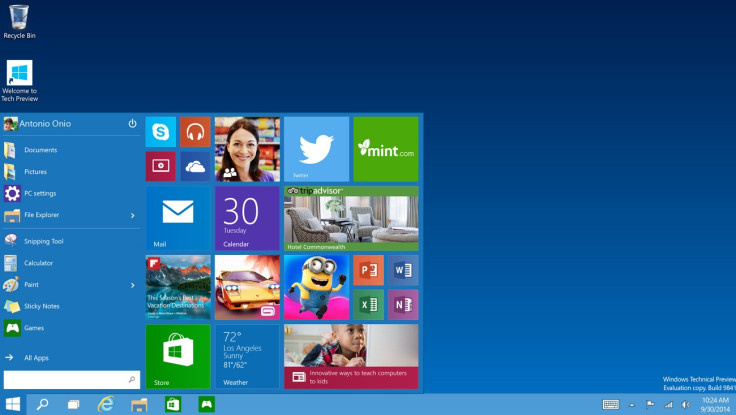Windows 10 Technical Preview: Microsoft Monitors All Personal Information, Usage Activities, and Keyboard Inputs

Microsoft Windows 10 saw a beta Enterprise Technical Preview version released last week, and already millions of downloads have been made.
Those who have downloaded the beta Windows 10 Enterprise Technical Preview need to know that Microsoft collects information related to you in a 'variety of ways.' The company claims that it uses this information to 'operate effectively' and thereby offer you the best experiences and services.
If you shout 'data privacy breach!' then the Redmond-based company advises you to back-off from installing the Windows 10 Technical Preview.
What Information Does Microsoft Collect?
The Redmond-based company states in its privacy statement that, once you agree to the terms and conditions and install the Technical Preview, you will be giving away personal information such as:
- Data stored within your Microsoft Account;
- Information about how you use your devices on which the pre-release version of Windows runs;
- All your browsing history;
- Phone call and SMS data;
- Device configuration and sensor data; and
- Information related to you such as name, email addresses, your preferences and interests.
In totality, Microsoft will get to know whatever you do while you run the latest Windows 10 Technical Preview on your computers.
"For example, when you: install the Program, we may collect information about your device and applications and use it for purposes such as determining or improving compatibility. Use voice input features like speech-to-text, we may collect voice information and use it for purposes such as improving speech processing," states Microsoft, in its privacy statement.
Whatever You Type Also Gets Recorded by Microsoft
If you use the Windows 10 Technical Preview, do keep in mind that engineers at the Redmond-based company are also monitoring what you type on your keyboard when online, and what you save within your computer.
Call this an excess, but Microsoft will use your preferences to 'improve' features like autocomplete and spellcheck.
"Open a file, we may collect information about the file, the application used to open the file, and how long it takes any use it for purposes such as improving performance," adds Microsoft.
Usage of Collected Data
Microsoft states that it always shares data to third-party/partners only with your consent. But you may fret about why the company even accessed all your personal data in the first place.
"We use your contact information to communicate with you, for example, to inform you about the Program, updates, and related products and services. We use information about your preferences to configure Program features. For example, we use information we learn about your interests to help make the ads we show you more relevant, and we use your voice data to improve speech recognition."
How to Prevent Microsoft From Accessing Your Confidential Data?
To control data transmission may literally be impossible. However, you do have an option of uninstalling various programs (within your OS) that are enabled to transmit data to Microsoft.
The 'data transmit' feature within these programs is generally enabled by default, when you install the operating system in the first place.
But identification of programs that transmit data automatically to Microsoft should be a Herculean task especially for the not-so-tech-savvy Windows user.
Enhanced Services/Better Functionality in Future
Microsoft seemingly believes that you deserve better services in future, and all your data will be used and processed by Redmond to offer you a personalised experience when (if) you use the company's OS next time around.
I Want to Know What Exactly Happens Behind the Scenes
To obtain even the most minute detail regarding privacy in pre-release Windows OS versions, you could contact Microsoft's chief-privacy officer:
- By Phone: 425-882-8080
- Mail: Windows Pre-Release Privacy, Microsoft Corporation, One Microsoft Way, Redmond, Washington 98052 USA
- Specialised web form: Click here to access
© Copyright IBTimes 2025. All rights reserved.





















